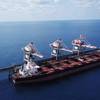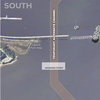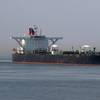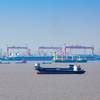Top Ships 3Q, 9 Mo Results
Top Ships Inc. (NASDAQ:TOPS) announced its operating results for the third quarter and nine-month period ended September 30, 2008.
For the three months ended September 30, 2008, the company reported net income of $41,640,000, or $1.48 per share, compared with net loss of $21,986,000, or $1.80 per share, for the third quarter of 2007. The weighted average numbers of common shares used in the computations were 28,153,538 and 12,222,812(1) for the third quarter of 2008 and 2007, respectively. The results for the third quarter of 2008 include the following items: a net charge of $4,277,000 of stock-based and cash compensation, a net charge of $2,783,000 from changes in the fair value of financial instruments, a net charge of $490,000 from the amortization of financing fees due to the sale of vessels and a net gain of $18,978,000 from the sale of vessels. For the three months ended September 30, 2008, operating income was $49,127,000, compared with operating loss of $15,309,000 for the third quarter of 2007. Revenues for the third quarter of 2008 were $71,094,000, compared to $51,193,000 recorded in the third quarter of 2007.
For the nine months ended September 30, 2008, the company reported net income of $17,210,000, or $0.70 per share, compared with net loss of $11,711,000, or $1.04 per share, for the nine months ended September 30, 2007. The weighted average numbers of common shares used in the computations were 24,556,897 and 11,280,551(1) for the nine months ended September 30, 2008 and 2007, respectively. For the nine months ended September 30, 2008, operating income was $53,771,000, compared with operating loss of $3,210,000 for the nine months ended September 30, 2007. Revenues for the nine months ended September 30, 2008 were $220,418,000, compared to $200,470,000 recorded in the nine months ended September 30, 2007.
Evangelos J. Pistiolis, President and Chief Executive Officer of Top Ships Inc., commented, "We are pleased to see the Company reporting a quarter with solid operational and financial results. During the third quarter of 2008 we completed a number of transactions in order to enhance our shareholders' value. The most notable events of the quarter were:
• Termination of 5 bareboat charters and recognition of a $15.6 million deferred gain from the sale of the respective vessels.
• Delivery of 5 Suezmax tankers (Stainless, Limitless, Endless, Edgeless, Ellen P) to their new owners and recognition of a $18.9 million net gain.
• Conclusion of finance of our new-buildings which was completed in early October 2008.
During the third quarter of 2008, the company announced that it had entered into an exclusivity agreement with an affiliate of George Economou, a Greek shipowner, providing for the exploration by such affiliate of the possible acquisition of the Company at a potential price of $6.00 per share. This exclusivity agreement was set to expire on October 8, 2008, but was extended until October 22, 2008, at which date George Economou's affiliated entity offered to acquire each of the company's issued and outstanding common shares for a purchase price of $3.00 per share, in cash. After consideration of numerous factors, including the recent volatility in global markets and decline in the company's share price on the Nasdaq Stock Market, the company's Board of Directors determined that this offer was not in the best interest of shareholders.
Finally, our Board of Directors has authorized a share repurchase program up to $20 million with a duration of one year."
Recent Developments
Our Board of Directors has appointed as of November 20, 2008 Mr. Alexandros Tsirikos as Executive Director and Treasurer of the Company. Mr. Tsirikos, 34, is a UK qualified Chartered Accountant (ACA) and has been employed with Top Ships since July 2007 as the company's Corporate Development Officer. Prior to joining TOP Ships, Mr. Tsirikos was a manager with PricewaterhouseCoopers where he worked for six years. During his career with PwC, Mr. Tsirikos drew experience both from consulting as well as auditing as he was a member of the PwC Advisory team and the Assurance team. As a member of the Advisory team, he led and participated in numerous projects in the public and the private sectors, involving strategic planning and business modelling, investment analysis and appraisal, feasibility studies, costing and project management. As a member of the Assurance team, Mr. Tsirikos was part of the IFRS (International Financial Reporting Standards) technical team of PwC Greece and led numerous IFRS conversion projects for listed companies. He holds an MSc in Shipping Trade and Finance from City University of London and a Bachelor's Degree with honours in Business Administration from Boston University in the United States. He speaks English, French and Greek.
Fleet Report:
As of September 30, 2008, the Company's fleet consisted of 12 vessels, or 0.6 million dwt (including 7 owned and 5 vessels sold and leased back for a period of five to seven years) as compared to 20 vessels, or 2.2 million dwt on September 30, 2007 (including 9 owned and 11 vessels sold and leased back for a period of 5 to 7 years).
In June 2008, the Company entered into agreements to sell five Suezmax tankers (M/T Stormless, M/T Edgeless, M/T Ellen P., M/T Limitless and M/T Endless) to unrelated third parties for a total consideration of $240.0 million. The vessels were delivered to their new owners in the second and third quarter of 2008 and a gain from the sale of $21.2 million was recognized upon vessels' deliveries.
In July 2008 the company and the owner and lessor of M/T Sovereign agreed to sell the vessel to a third party. The Company and the lessor mutually agreed to terminate the bareboat charter, on August 14, 2008, upon the vessel's delivery to its new owners. Following the bareboat termination, $1.4 million, net of $0.5 million of sale expenses is included in Amortization of deferred gain on sale of vessels.
In September 2008, the company and the owners and lessors of M/T Flawless, M/T Timeless, M/T Priceless and M/T STopless agreed to sell the vessels to a third party. The company and the lessors mutually agreed to terminate the bareboat charters, on September 18, 2008, upon the vessels' deliveries to their new owners. Following the bareboat charters termination, $14.2 million, net of $12.9 million and $1.5 million of sale expenses and gain from the sale of vessels, respectively, was recognized and is included in Amortization of deferred gain on sale of vessels.
Fleet Deployment:
During the third quarter of 2008, the company had approximately 81% of the fleet's operating days on long-term employment contracts. As of September 30, 2008, eleven of the company's 12 vessels were on time charter contracts with an average term of over two years with all but four of the time charters including profit sharing agreements and one vessel under bareboat charter with a term of over three years.
Tanker Vessels:
During the third quarter of 2008, five of the company's Suezmax tankers operated in the spot market, earning on average $61,053 per vessel per day on a time charter equivalent (TCE) basis.
During the third quarter of 2008, three of the company's Suezmax tankers operated under time charter contracts, earning on average $38,343 per vessel per day on a time charter equivalent (TCE) basis.
All of the Company's Handymax tankers operate under long term employment agreements that provide for a base rate and additional profit-sharing.
During the third quarter of 2008, the company's Handymax tankers earned on average $19,309 per vessel per day on a time charter equivalent (TCE) basis, including the profit-sharing allocated to the company.
During the third quarter of 2008, one of the company's Handymax tankers, prior to its delivery to its new owners, operated in the spot market, earning on average $53,053 per vessel per day on a time charter equivalent (TCE) basis.
Drybulk Vessels:
During the third quarter of 2008, four of the company's drybulk vessels operated under time charter contracts and one under bareboat charter, earning on average $50,042 per vessel per day on a time charter equivalent (TCE) basis, including the amortization of the fair value of time charter contracts of $9,900 per vessel per day.
Liquidity and Capital Resources
As of September 30, 2008, Top Ships had total indebtedness under senior secured credit facilities of $317.4 million (excluding unamortized financing fees of $3.3 million) with its lenders, the Royal Bank of Scotland ("RBS"), HSH Nordbank ("HSH"), DVB Bank ("DVB"), Alpha Bank ("ALPHA") and Emporiki Bank ("EMPORIKI"), maturing from 2013 through 2019.
Since the company's formation, the sources of funds have been cash from operations, long-term borrowings and equity provided by the shareholders. The company's principal use of funds has been capital expenditures to establish and grow its fleet, maintain the quality of its vessels, comply with international shipping standards and environmental laws and regulations, fund working capital requirements and make principal repayments on outstanding served loan facilities. The company expects to rely upon operating cash flows, long-term borrowings and equity financings to implement its future growth plan.
In December 2007 and in April 2008, the company raised $120.0 million of equity capital to fund its diversification in the dry bulk sector and its newbuilding program. All except one of the vessels of the company are chartered under long-term employment agreements that are expected to provide a secured stream of revenues and operating cash flows.
Moreover, the company generated, after debt repayment, approximately $90.0 million out of the sale of the five double-hull Suezmax tankers delivered to their new owners during the second and third quarter of 2008.
In addition, during the third quarter and early October 2008, the company has entered into agreements with three banks for the financing of its newbuildings.
Therefore, the company expects that its working capital generation, in combination with the existing cash balances, its recent equity offerings and the net proceeds from the sale of the five Suezmax tankers will be sufficient to cover its liquidity requirements for the next year.
As of September 30, 2008, the company has three interest rate swap agreements with RBS for the amounts of $26.9 million, $10.0 million and $10.0 million for a remaining period of one, five and five years, respectively. Under these agreements the interest rate is fixed at an effective annual rate of 4.66% (in addition to the applicable margin), 4.23% and 4.11%, respectively. The company also has one interest rate swap agreement with Egnatia Bank for the amount of $10.0 million for a remaining period of five years, respectively. Under this agreement the interest rate is fixed at an effective annual rate of 4.76%. In addition, the company has four interest rate swap agreements with HSH for the amounts of $34.5 million, $16.0 million, $7.7 million and $14.0 million, for a remaining period of three, five, five and seven years, respectively. The company also has a forward interest rate swap agreement with HSH for the amount of $15.1 million effective in June 2010 for a period of four years, at a fixed interest rate of 4.73% in addition to the applicable margin. The above swaps of $10.0 million, $10.0 million and $10.0 million, include steepening terms based on the two and 10 year U.S. Dollar swap difference, which is calculated quarterly in arrears. The interest rate for the remaining balance of the loans is LIBOR, plus the margin.
In November 2007, the company entered into an interest rate derivative contract, under which the Company will pay five annual interest payments on a notional amount of $85.0 million. Based on the cumulative performance of a portfolio of systematic foreign exchange trading strategies, the interest payments will have a minimum floor at 0.00% and a cap at 7.50%. On September 15, 2008, the parent company of the counterparty in this derivative product, announced its intention to file a petition under Chapter 11 of the U.S. Bankruptcy Code with the United States Bankruptcy Court for the Southern District of New York. Soon after this announcement, the company initiated discussions with the counterparty in order to examine the potential effect of this bankruptcy on the Company's liability. The counterparty brought to the company's attention the following information:
• The counterparty's assets and liabilities have been under bankruptcy administration since September 15, 2008.
• The relevant basis of calculation of the value of the derivative product, the underlying index, no longer exists as a result of the bankruptcy. The last date the relevant basis was available was September 12, 2008.
• The counterparty's administration has a target of completing the liquidation of assets and settlement of all liabilities by year end 2008.
As a result of the above, the company has been considering a potential settlement of the outstanding liability, even though it is not legally required under the contract. Since the underlying index of the derivative instrument no longer exists, the company has classified the liability within its current liabilities, as valued on September 12, 2008 of $15.2 million. The liability is classified as current as it is the company's intention to settle the liability should the terms of settlement be in the best interests of the company's shareholders within the next 12 months. However, it cannot be guaranteed that such a settlement will be reached within the next 12 months. Settlement discussions are ongoing.
In April 2008, the company mutually agreed with Deutsche Bank to terminate the $50.0 million swap. The outstanding liability of $7.5 million was repaid by September 30, 2008, in varying installments.
In May 2008, the company entered with EMPORIKI into an interest rate swap agreement for a notional amount of $20.0 million for a seven year period. This swap includes steepening terms based on the two and 10 year Euro swap difference, which is calculated quarterly in arrears.
On September 30, 2008, the company's ratio of indebtedness to total capital was approximately 52.5%.
In April 2008, the company privately placed 7.3 million common shares for aggregate net proceeds of $50.6 million with various investors. The 7.3 million shares were sold for $7.00 per share, which represents a discount of 15.5 percent based on the closing share price of $8.28 on April 23, 2008. Proceeds from this offering were used for debt repayment and for general corporate purposes. On July 3, 2008 the company filed a registration statement to register those shares for resale, which was declared effective on July 15, 2008.
As of December 31, 2007, the company was not in compliance with one of its financial covenants, (the adjusted EBITDA covenant, as defined by each bank) but has obtained waivers up to and including December 31, 2008. No assurance can be given with respect to future compliance with covenants. If the company is not in compliance with certain covenants under its debt or derivative agreements and acceptable waivers are not obtained, the company would be in default and the banks could exercise their remedy rights including, but not limited to, accelerating the outstanding indebtedness and taking possession of the underlying collateral securing the indebtedness. In the event this was to occur, there can be no assurance that the company will be able to continue as a going concern.
The company's loan agreements for its borrowings, which are secured by liens on its vessels, contain various financial covenants. Among those covenants are requirements that relate to company's financial position, operating performance and liquidity. For example, there is a minimum ratio requirement that is based, in part, upon the market value of the vessels securing the loans. The market value of vessels is sensitive, among other things, to changes in the shipping charter market, with vessel values deteriorating in times when charter rates are falling and improving when charter rates are anticipated to rise. The current significant decline in charter rates in the shipping market coupled with the prevailing difficulty in obtaining financing for vessel purchases has adversely affected vessel values. A continuation of these conditions would lead to a significant decline in the fair market values of company's vessels, which may result in company's not being in compliance with these loan covenants. In such a situation, unless company's lenders were willing to provide waivers of covenant compliance or modifications to company's covenants, or would be willing to refinance, the company would have to sell vessels and/or seek to raise additional capital in the equity markets.
If the company is not in compliance with the covenants and is not able to obtain covenant waivers or modifications, its lenders could require the company to post additional collateral, enhance its equity and liquidity, increase its interest payments or pay down its indebtedness to a level where it is in compliance with its loan covenants, sell vessels, or they could accelerate its indebtedness, which would impair its ability to continue to conduct its business. If the company cannot obtain covenant waivers or modifications and cannot meet the lenders requirements described above, it might not be able to refinance its debt or obtain additional financing and could lose some or all of its vessels if its lenders foreclose their liens. In addition, if the company finds it necessary to sell the vessels at a time when vessel prices are low, it will recognize losses and a reduction in its earnings, which could affect its ability to raise additional capital necessary for the company to comply with its loan covenants and/or the additional lender requirements described above.
(www.topships.org)










